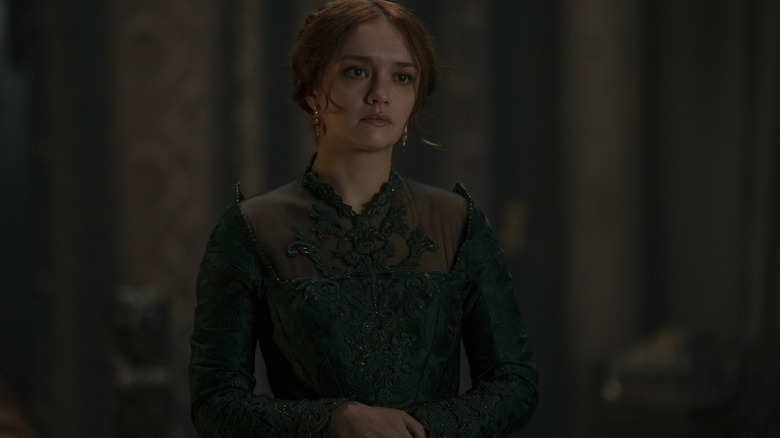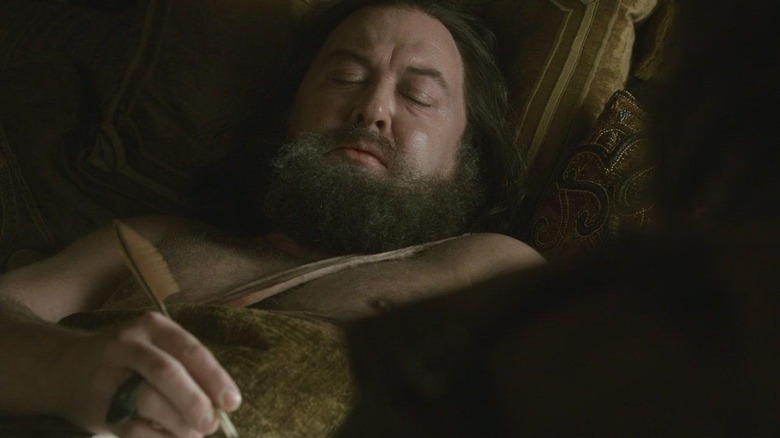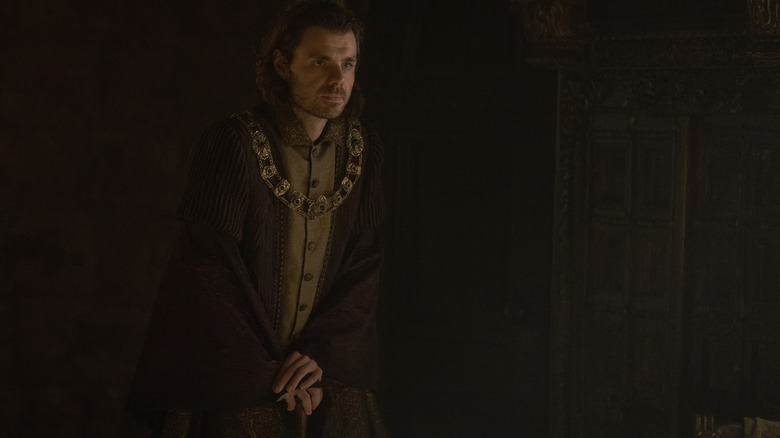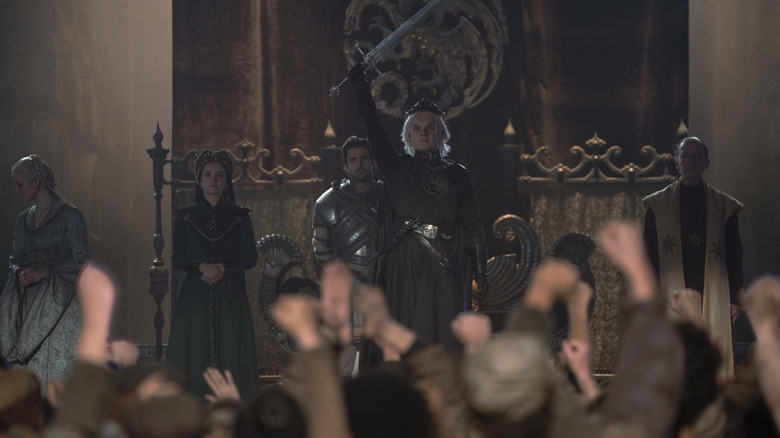House Of The Dragon Just Echoed One Of The Game Of Thrones' Most Devastating Episodes
The night is dark and full of spoilers. Go no further if you haven't seen the latest episode of "House of the Dragon."
When you play the game of thrones, you either win ... or you die.
Everyone knows that successions are far from a simple matter in the "Game of Thrones" universe, and this latest episode of "House of the Dragon" was no different. After yet another time jump last week, "The Green Council" zeroed in on the immediate aftermath to depict the food frenzy that followed King Viserys' (Paddy Considine) death as the Targaryen family — or the "greener" half of them, at least — finally made their move for control of the Iron Throne. This episode gave us a curious interpretation of a king's last dying words, several layers of political machinations and plotting, and what essentially amounts to a coup attempt to usurp the throne. If all of that sounds vaguely familiar, well, that's because we've been here before.
In many ways, "The Green Council" follows the main narrative beats already covered in "You Win or You Die," the eighth episode of "Game of Thrones" season 1. It might seem almost quaint to look back on now, but the show's main storyline once unfolded in thrilling fashion like a medieval whodunnit — culminating in Ned Stark's (Sean Bean) discovery of the Lannister twins' incest, their children's illegitimacy to rule as heirs to King Robert Baratheon (Mark Addy), and the noble Stark's ultimately fruitless attempt to prevent the crown from falling into enemy hands.
Though "House of the Dragon" has succeeded by standing on its own two feet, these parallels only serve to enrich both properties. By retreading old ground, the spin-off series seems to argue that the more things change, the more they stay the same.
Last wishes
Remember that great scene in season 2 of "Game of Thrones" where two main characters dispensed with subtext altogether and directly discussed the nature of power and where it really resides? "House of the Dragon" neatly evoked that conversation with the fallout of King Viserys' death and the mad scramble for power that followed — all despite his extremely public decree that his daughter Rhaenyra (Emma D'Arcy) follow him as his lawful heir.
You see, even a dead king's actual wishes don't matter nearly as much as what those who hold the strings say his wishes were. Thanks to his failing health and a final message lost in translation, Queen Alicent (Olivia Cooke) mistakenly took Viserys' last words regarding Aegon the Conqueror's prophecy as a change of heart about the succession and a plea for Alicent's son Aegon (Tom Glynn-Carney) to become king in his stead. Whether this was an honest mistake or a willful mistranslation borne out of ambition (the episode supports both readings, if you ask me), the end result is exactly the same. When facts and reality don't quite conform to one's personal goals, simply twist the truth until it does.
This directly lines up with what certain "Game of Thrones" characters would eventually do hundreds of years later. While King Robert dictated his final wishes on his deathbed to his loyal friend Ned, scrawling down the king's decree regarding Ned taking on rulership of the Seven Kingdoms until his son (or his heir, as Ned somewhat duplicitously changes) comes of age, the ruthless queen Cersei (Lena Headey) openly mocks the power that a piece of paper could ever contain and moves forward with Joffrey's (Jack Gleeson) unsanctioned coronation anyway.
As both Cersei and Alicent prove, power is only in the eye of the beholder.
The dirty work
As much as the end result of dramatic power plays and coups take place in public, with rushed coronations trotted out in front of thousands to legitimatize such blatant overreach of power, the real dirty work behind such efforts are the result of deeds done entirely in secret. "Game of Thrones" always had Varys (Conleth Hill) and Peter "Littlefinger" Baelish (Aiden Gillan) to serve such roles, and now "House of the Dragon" has finally built up schemers like Larys Strong (Matthew Needham) and Mysaria (Sonoya Mizuno), the "White Worm," to further complicate these murky politics.
In "Game of Thrones," at a moment of profound crisis after Robert's death, Ned Stark is forced to ally himself with the treacherous Littlefinger to do the most dishonorable thing. He pays off the City Watch to side with Stark against Cersei and Joffrey, a moral compromise that backfires terribly when Littlefinger betrays him anyway.
With a power vacuum to be filled at the heart of the Red Keep, several main figures in "House of the Dragon" immediately turn to their shadiest sources to locate the reluctant heir Aegon in order to help secure their own ambitions. For Otto Hightower (Rhys Ifans), that means enlisting Daemon Targaryen's (Matt Smith) one-time paramour Mysaria, who has since turned into an unlikely player in the game, wielding the power to make kings or break them when she finds the missing Aegon first. Alicent, meanwhile, has made a deal with the devil in the form of the villainous Larys, who happily carries out torture, murder, and worse at the slightest nod of approval — all in return for satisfying his creepiest urges.
No matter how noble and righteous a cause may be, nobody's hands remain clean for long when playing the game of thrones.
The queen's gambit
Both "Game of Thrones" and "House of the Dragon" have centered on powerful women who've found themselves on the outside looking into a world ruled by and for men. Both shows have made convincing cases for why these power structures ought to be uprooted entirely as opposed to reformed, but ultimately not even dragons can help them escape the crushing weight of an uneven playing field. But that doesn't mean they won't die trying, anyway.
Characters like Cersei (and even Daenerys Targaryen) typified this fruitless chase best in "Game of Thrones." When confronted with Ned's knowledge of the truth, Cersei doesn't back down or sue for mercy. She delivers perhaps the most memorable line of the entire series and doubles down on her plans.
"House of the Dragon" has done an effective job of maintaining viewer interest in a cast of characters who, to be brutally honest, aren't all that honorable. Both Alicent and Rhaenyra have had ample opportunity to set aside their petty grievances and, for better and worse, neither seem willing to do so. In one of the last episode's best moments, it takes Princess Rhaenys (Eve Best), the Queen Who Never Was, to cut through the armor that Alicent has put up and call her out for following the orders of all the men in her life — her father, her now-late husband, and her son — as opposed to taking control of her own fate for a change. But even Rhaenys' bombastic display atop her dragon in the episode's rousing final moments likely won't be enough to stave off the onset of war when so much is at risk.
Like Cersei before her, Alicent has given the people their new king ... along with an upcoming war, for their trouble.



